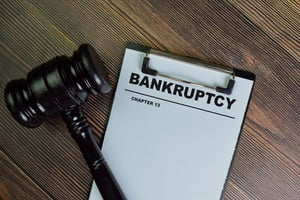 A Chapter 13 bankruptcy is a three-five year repayment plan, whereby the debtor pays in as much as they can afford to their creditors each month. At the end of the plan, the debtor will receive a bankruptcy discharge of their remaining debts. Therefore, in a Chapter 13 bankruptcy, typically a debtor does not pay their debts back completely in full. Absent certain exceptions, a debtor will receive a “wipe out” of most of their unsecured debts. Although a Chapter 13 bankruptcy provides a great opportunity for many Minnesotans who are struggling to pay their debts to achieve financial relief, not all Chapter 13 bankruptcy plans are successful. The most common reason for an unsuccessful Chapter 13 bankruptcy is the failure to make consistent monthly payments. Debtors often encounter unforeseen and difficult circumstances that arise after their case is filed. For example, the debtor may experience significant loss in income or a reduction in household income due to a loss of a job or unforeseen expenses. In many of these cases, the bankruptcy court may allow the debtor to file a modified plan based on these changed circumstances, as long as the modified plan still provides the minimum amount that needs to be paid to creditors.
A Chapter 13 bankruptcy is a three-five year repayment plan, whereby the debtor pays in as much as they can afford to their creditors each month. At the end of the plan, the debtor will receive a bankruptcy discharge of their remaining debts. Therefore, in a Chapter 13 bankruptcy, typically a debtor does not pay their debts back completely in full. Absent certain exceptions, a debtor will receive a “wipe out” of most of their unsecured debts. Although a Chapter 13 bankruptcy provides a great opportunity for many Minnesotans who are struggling to pay their debts to achieve financial relief, not all Chapter 13 bankruptcy plans are successful. The most common reason for an unsuccessful Chapter 13 bankruptcy is the failure to make consistent monthly payments. Debtors often encounter unforeseen and difficult circumstances that arise after their case is filed. For example, the debtor may experience significant loss in income or a reduction in household income due to a loss of a job or unforeseen expenses. In many of these cases, the bankruptcy court may allow the debtor to file a modified plan based on these changed circumstances, as long as the modified plan still provides the minimum amount that needs to be paid to creditors.
A Chapter 13 plan modification is not possible in all cases, and sometimes, the financial circumstances are too difficult to be overcome. In these situations, a debtor may have their Chapter 13 case “dismissed.” When a Chapter 13 case is dismissed, the immediate consequence is that the debtor is no longer protected by the automatic stay. This means that the debtor’s creditors may legally pursue debts against the debtor, just as they were able to do prior to the debtor’s bankruptcy filing. If the debtor’s Chapter 13 plan has been confirmed before being dismissed, the money that has been paid in the plan has gone to pay the debtor’s creditors. This means that the debts not paid will still be the debtor’s responsibility after dismissal of the Chapter 13 bankruptcy. The debtor will not receive a bankruptcy discharge. The good news is that bankruptcy law is generally very forgiving and will allow the debtor to refile their Chapter 13 bankruptcy case, so long as the debtor is not acting with a bad faith intention of filing for bankruptcy just to defraud their creditors. However, when a debtor refiles their case, the debtor must essentially start their three-five year plan from the beginning. Also, if the debtor refiles their case within a year after their previous Chapter 13 case was dismissed, they will only have the benefit of the automatic stay for thirty days after their case is filed, unless the debtor files a motion asking the court to maintain the automatic stay. If a debtor has had more than one Chapter 13 case dismissed in the year prior to filing their new Chapter 13 case, the automatic stay will not go into effect in their new case, until the debtor files a motion with the bankruptcy court asking for the court to impose the automatic stay. The court will only impose the automatic stay if the debtor can prove they are not continuously filing in bad faith.
CALL NOW FOR A FREE STRATEGY SESSION FROM A MN BANKRUPTCY LAWYER AT LIFEBACK LAW FIRM
To successfully complete a Chapter 13 bankruptcy, it would be wise to follow the advice of an experienced bankruptcy attorney. Come visit us at our new location in St. Paul, Minnesota, or come see us at LifeBackLaw.com!


